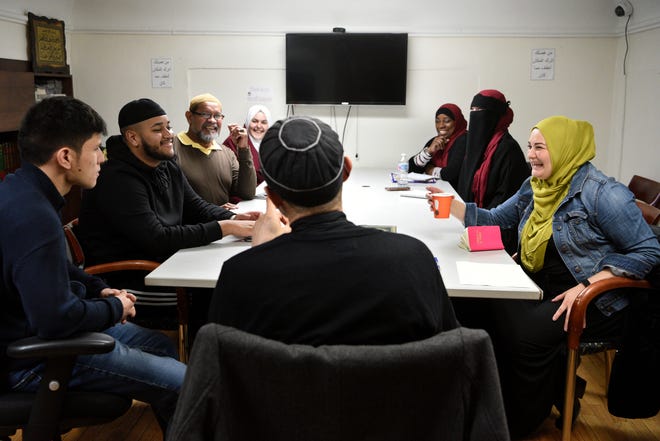“My family didn’t know the implications [of my conversion], that it was a lifestyle. It was more when I started to practice Islam that they were like ‘Whoa, qué pasa aquí?’” she said, using Spanish for “what’s happening here?”
Tanju had her own struggles adjusting to the faith. She started wearing the hijab because she wanted to live an authentic and pious Muslim life, she said. But publicly, she felt as if people were watching and judging her. Privately, she worried that the hijab made her look unattractive.
“ ‘Just take it off. You look ugly, disgusting; you don’t look attractive’ — I kept hearing these things in my head,” said Tanju, a teacher’s aide and Hackensack resident.
She didn’t know whom to talk to about her worries. Later, she began attending events for new converts and volunteered at WhyIslam, a nonprofit based in Somerset that teaches about the faith and has a division in Spanish.
About a year ago, she started going to weekly classes at the North Hudson Islamic Educational Center in Union City, where Latinos make uproughly 10 percent of the congregation.
“I feel really happy,” she said. “I don’t feel lonely in my spiritual path.”
Outreach to Latinos Latino Muslim communities have found a home in mostly urban areas like New York City, Miami, Chicago, Los Angeles and Houston.
Their backgrounds are diverse. About 56% converted from Catholicism and the rest from Protestant faiths or secular or atheist lives, according to the “Latino Muslims in the United States” report.
They differ, too, in the way they live their lives as Muslim converts. Some women wear the hijab, while others do not. Some still enjoy Christmas as a secular celebration with family, but others choose to abstain.
They are part of a religious shift for Latino Americans. Just under half — 47% — describe themselves as Catholic, down from 57% a decade ago, according to a Pew survey released last month. The share of Latino Protestants has remained steady at about a quarter of the total.
Fewer than 1% are Muslim, according to the survey. But that demographic hasdrawn attention partly because of the perception that Islam is foreign or at odds with the Latino culture typically associated with Catholicism.
Latino Muslim groups say Islam is, in fact, part of their heritage. They say they are returning to their roots because of the nearly 800-year Moorish rule of Spain that left an Islamic influence on Hispanic language and culture.
Those ties are often cited by Muslim outreach groups, said Harold Morales, an associate professor of philosophy and religious studies at Morgan State University in Baltimore.
The message is that “we’re not choosing to abandon Latinx culture or embrace marginalization. We’re choosing to embrace something that’s already there,” said Morales, who wrote the 2018 book “Latino and Muslim in America: Race, Religion, and the Making of a New Minority.”
Morales said the 2016 election cycle, marked by a rise in hate speech and bias crimes against Latinos and Muslims, led to even closer ties as the groups mobilized around issues like immigration and discrimination.á
Spreading the word At the North Hudson Islamic Educational Center, where Lopez and Tanju pray, the number of Latino converts has increased steadily since the mosque opened in 1992, said Mohammad Alhayek, the imam, or spiritual leader, of the mosque.
The mosque sits amid one of the state’s biggest Latino populations, drawing families from the Dominican Republic, Colombia, Cuba and Ecuador. It’s just off Bergenline Avenue, a bustling street lined with bodegas, bakeries and restaurants with bilingual signs, where Spanish conversations are often within earshot.
Alhayek said the mosque’s outreach effort, which includes information tables on Bergenline, has been key to growth.
This fall, the committee held its 18th annual Hispanic Muslim Day. Next month, Imam Wesley Lebrón, a Passaic-born clergyman of Puerto Rican ancestry, will lead a course on how to teach about Islam, with a special focus on Latinos.
At the mosque, it’s not unusual to spot a Spanish-language Quran or see empanadas served alongside foods from the Middle East at potluck dinners.
“Our vision is to share the true teachings of Islam, the guidance of Islam, with as many people [as we can] in the North Jersey Hudson area,” Alhayek said. “That is our first priority, and then beyond [to reach] as many people as we can.”
Hannan Adely covers education and diversity news for NorthJersey.com. To get unlimited access to the latest news, please subscribe or activate your digital account today .


